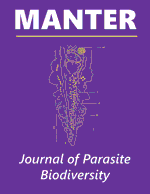Parasitology, Harold W. Manter Laboratory of

MANTER: Journal of Parasite Biodiversity
ORCID IDs
Date of this Version
12-15-2022
Document Type
Article
Citation
MANTER: Journal of Parasite Biodiversity (December 12, 2022 number 25
doi: 10.32873/unl.dc.manter25
Abstract
Emerging infectious diseases (EIDs) are, besides a question of food safety and public health, an ecological and evolutionary issue. The recognition of this condition combined with the accumulation of evidence that pathogens are not specialists in their original hosts evidences the need for understanding how the dynamics of interaction between pathogens and hosts occurs. The Stockholm Paradigm (SP) provides the theoretical fundaments to understand the dynamics of diseases and design proactive measures to avoid the emergence and reemergence of infectious diseases. In this review, we revisit the models that evaluate several aspects of the proposed dynamics of the SP, including the complexity nature of the elements that have been associated with this new framework for the evolution of associations. We integrate the results from these studies into a putative dynamic of infectious diseases, discuss subordinate elements of this dynamic, and provide suggestions on how to integrate these findings into the DAMA (Document, Assess, Monitor, Act) protocol.


Comments
Copyright © 2022, Souza, Araujo, and Boeger
License: CC BY-NC-SA 4.0 International